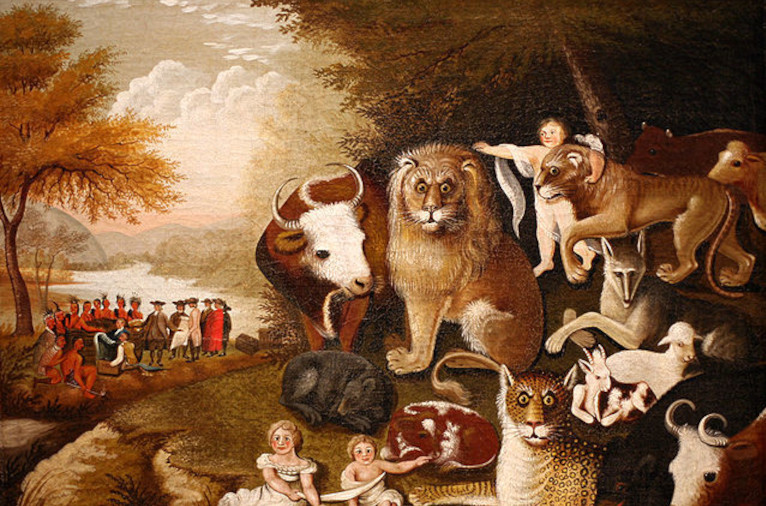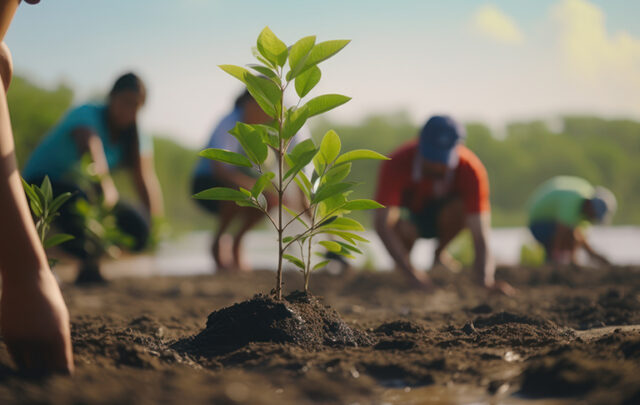Editors note:
The message in this book from two Mennonite authors should resonate with readers of Resilience. I’m personally indebted to the Mennonites for introducing me to simple living in the late 70s through the More-with-Less Cookbook by Doris Longacre-Janzen.
Sarah Augustine (who is Native) and Sheri Hostetler (white settler) write from the perspective of their Indigenous and Amish or Mennonite backgrounds. They co-founded an Indigenous justice organization called the Coalition to Dismantle the Doctrine of Discovery. It seeks to animate people of faith, starting with Mennonites, to work on decolonization in solidarity with Indigenous Peoples.
Sheri writes that she has been influenced by Resilience. She and Sarah just interviewed Richard Heinberg on their podcast Dismantling the Doctrine of Discovery (individual episode).
Mennonites are part of the Anabaptist tradition, and are related to the Amish.
– BA
So We and Our Children May Live: Following Jesus in Confronting the Climate Crisis
by Sarah Augustine and Sheri Hostetler
Foreword by Patty Krawec
Published by: MennoMedia
Imprint: Herald Press
200 Pages 5.25 x 8.00 in
Excerpt from the preface:
A decade ago, I realized I had to work on preventing climate change. My only child, Patrick, was eight at the time, and I kept imagining how I would justify myself to him decades from now. Would he be angry with me for my perceived inaction during those pivotal decades when we still had a chance to avert the worst catastrophes? Would my saying that we drove an electric car and used LED lighting cut it with future Patrick? Would he accept the excuse if I told him, “I was so busy with raising you and my job, and it all seemed so overwhelming, and I wasn’t sure where to start”? I had a feeling he would not, nor should he.
As I was trying to find a way to engage in this work, I met Sarah Augustine. Sarah is a Native woman fighting for Indigenous sovereignty and land justice; she framed this work as “resisting extraction.” Honestly, when I first met her, I wasn’t sure what extraction was or why it mattered in the fight against climate change. But I trusted that working with Sarah on resisting extraction was exactly what I needed to be doing, despite my inability to articulate this connection to climate change.
I finally get it. We are fighting to dismantle structures designed to remove Indigenous Peoples from their land so that our economic system can continue to extract and consume resources at an ever-increasing pace. This growth-based system, designed to generate wealth and profits for individuals, is threatening the survival of all life on this planet. Climate change, I have realized, is only one symptom of the real threat, which is ecological overshoot. Ecological overshoot occurs when our demands on the planet are greater than what Earth’s ecosystems can renew. Extraction and the pollution it causes are now pushing us past several planetary boundaries, including carbon dioxide emissions in the atmosphere. In short, extraction is devastating the life-support systems of our planet.
I’m now clear that I am not only fighting in solidarity with Indigenous Peoples. I am fighting for myself and for the life of my son and his friends. I am fighting for the life of Sarah’s son and his friends. I am fighting for my home and neighborhood, which sit at sea level. I am fighting for the life of the persimmon tree in my backyard that provides bushels of fruit for us, as well as for the Eastern fox squirrels and scrub jays that eat there. I am fighting for coral reefs, some of the most beautiful and necessary ecosystems on earth. I am fighting for air, water, soils. I am fighting for the entire buzzing, bountiful beauty of life on this planet.
I think most of us in the dominant culture don’t viscerally comprehend this direct connection between extraction and our own survival. When I mentioned this disconnect to Sarah recently, she said, “If you talk to Indigenous People around the world—from Africa and Asia to Norway to Central and South America to the United States—they will tell you the biggest threat to them is extraction. They know that climate change could get solved by electric vehicles and renewables, and brutal extraction will still occur.” Indigenous people know that extraction is based on a worldview that sees the Earth as a resource to accumulate wealth and profit. It is an inherently unsustainable worldview because it is not congruent with ecological reality. Sarah told me that you could walk onto any reservation in the United States and ask the average Native person about this, and the response would be, “The dominant culture is not normal, and it makes no sense.” In other words, the average Native person gets what it has taken me—a white settler working on Indigenous justice issues—years, if not decades, to really understand.
This book is structured to lead you through the process of discovering Reality, as I did. In part 1, we consider Reality versus reality. We contrast two systems of thought: systems of life (“reality” with a capital R), which acknowledge that we live within a closed system of mutual dependence, and systems of deaths (or what is considered reality in our dominant culture), which are based on an extractive logic.
I come from a long line of Amish Mennonite farmers who fled religious persecution in Switzerland in the 1730s. About a century later, my family made their way to Holmes County, Ohio, where they became the first white settlers in that place. My family has lived there ever since. I feel a deep connection to and love for that land, an emotion complicated by the knowledge that my family displaced people even more deeply connected to it. My Mennonite faith instilled in me the belief that I was to be in the world but not of it. For me, that means I am to constantly seek and see God’s kindom, which is true Reality and often not synonymous with the world as it is.
The second part of this book scrutinizes the only consensus solution to climate change available today: decarbonizing the global economy through a green growth, renewable energy revolution. We argue that this solution alone will not heal creation, end climate change, or dismantle oppressive systems. Many renewable energy industries continue to follow an extractive, colonizing logic; accumulation and perpetual economic growth are still desired outcomes. We must look beyond green growth. We need ecological justice and right relationship—not more limited ends such as green growth.
In the final part, we begin to imagine how we can make first steps toward the necessary transformations for a decolonized future. This includes (1) recognizing the primacy of land and Indigenous sovereignty over that land; (2) dismantling the structures that are designed to remove Indigenous peoples from their land so the system can continue to extract, consume, and grow; and (3) envisioning and building new economic and cultural systems that meet the needs of people and the planet.
“Where there is no vision, the people perish”
For me (Sarah), this book is about vision. We must have the courage to imagine together a way of living consistent with Reality, a way of being that is more than the way we live now. I would like to ask you to join us in acknowledging Reality as it is. While we may believe in our twenty-first-century, post-industrial context that reality depends on perpetual growth in a market economy, the creation that we depend on holds a different Reality. This Reality dictates that we are mutually dependent in a finite world. When we discuss this Reality, we capitalize the word, acknowledging that actual Reality is not a matter of opinion. We must imagine together how we can live in this Reality.
This is not a metaphor. I really mean it. If we aren’t willing to imagine a world beyond the death machine driving our nation and our world toward destruction, our days are numbered.
I am an Indigenous woman, and an assimilated one. I grew up in the mainstream, away from my land, language, people, and culture. Like many Indigenous people, I am displaced from the context of my people because my father was removed from his family when he was an infant. As an adult, I have explored my Indigenous identity and spirituality, learning how to be at ease in my own skin, and how to advocate for Indigenous people, my people. I am also a Christian, specifically a Mennonite. Mennonites and other Anabaptists are part of the Radical Reformation movement that emerged when Martin Luther was forming a way of understanding Christianity separate from the Holy Roman Empire. My Mennonite faith centers around active peacemaking, which includes simple living and a call to discipleship.
In 2013, I had a vision while I was in a sporting goods store parking lot. I was planning to buy a few things on my son’s list of school supplies. As I began walking through the large asphalt parking lot, a vision occurred: an explosion of sound, like a sonic boom, shakes the ground, and the black, oily surface of the parking lot splits beneath me. The sheet of asphalt where I am standing shoots up about ten feet, and another sheet that has broken off slides beneath it, blasting me and the ground under me further up. The parking lot fractures into islands of black asphalt floating on a liquified earth. My mind races—how will I get to my son? He is maybe twenty miles away. It is clear I won’t be able to drive there. And then it hits me: I might not live through this. I might not be able to find a way out of this parking lot.
This vision passed through my mind in a flash. The destructive surroundings enveloped me and then suddenly were gone, and once again I was walking through a perfectly mundane, flat parking lot. But in my mind and heart, I could feel the visceral truth of the experience. I could hear inside my head a truth I had not spoken: catastrophic change is coming.
At the time I experienced the waking dream in the sporting goods store parking lot, it was clear to me that my life would change course. Big change was on the way, and I would need to be prepared for the earth to shake and for the very ground under my feet to become unstable. That was the start of my journey of laboring with the church to seek justice with Indigenous Peoples dehumanized by resource extraction. The waking dream also told of the distress of the earth itself, bearing witness to and protesting with the voices of the oppressed.
We must decide today
This morning, right before writing this preface, I (Sheri) read a front-page headline in the New York Times: “Earth Is Near the Tipping Point for a Hot Future.” The subheads continued, “Alarm in UN Report” and “Calls for Drastic Action within This Decade to Avert Disaster.” The article referred to the latest report from the Intergovernmental Panel on Climate Change, which warns that unless drastic changes are made, we will surpass the critical threshold of 1.5 Celsius degrees of warming by the beginning of the next decade.[ix] We’ve diddled, we’ve dawdled, and we’ve been in denial. But the choice is clear, the report says. We are heading toward catastrophe, and we must choose to imagine and do something different. Now. Today.
The choices are limited, even simple: We can imagine and choose a life-sustaining, just civilization, or we can continue business as usual. Life and death. What’s good and what’s wrong. That is our choice.
As the authors of this book, we hope that what we have written will help us choose life and what’s good so that we and our children may live.





